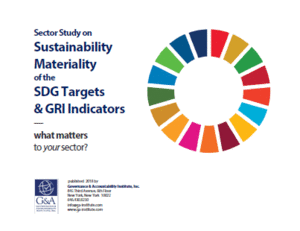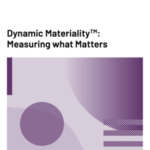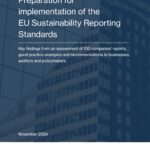
Governance & Accountability Institute today announces the release of its year-long, comprehensive “Sector Study on Sustainability Materiality of the SDG Targets & GRI Indicators.” This research project was designed to examine sector trends in the ESG materiality decisions of 1,387 GRI reporters across 40 sectors on each of the 91 GRI G4 Specific Standard Disclosure Indicators.
By utilizing linkage documents such as the SDG Compass’ “Inventory of Business Indicators” and the GRI’s “Mapping the G4 to the GRI Standards” the research also used the GRI G4 indicators as a type of Rosetta Stone to translate and examine trends in materiality decisions on topics related to the 169 SDG Targets, and GRI-Standards disclosures.
G&A Institute’s Co-Founder, Louis Coppola, architect of the study explains: “It’s important to keep in mind that organizations in this study published their reports using GRI for their sustainability reporting. Determinations of what is included in an organization’s GRI report are informed by the GRI Principles of ‘Materiality’ and ‘Stakeholder Inclusiveness.’ Therefore the results of our research and rankings are informed by the corporate sectors’ collective materiality assessments, stakeholder engagements, and decision-making of these 1,387 reporting organizations.”
The 2030 Agenda for Sustainable Development widely acknowledges that the private sector will be one of the most significant sources of resources, action and technical capacity relied upon by the global society to achieve the Sustainable Development Goals.
With a whole new ESG language now evolved — The SDG’s 17 Goals & 169 Targets — and hundreds of key performance indicators to master, business leaders and other stakeholders are justifiably challenged as how to interact with these new global ambitions, and how then to report on their progress.
“We believe the combined materiality decisions of these 1,387 reporting organizations from around the world, across 40 sectors, is a powerful ‘Big Data’ set for us to explore these challenges with corporate managers, investors and other stakeholders,” said Coppola.
“We plan to continue to add to and mine this Big Data set and will publicly share the results in various ways. For our corporate clients, we will utilize this data set to enhance our engagements and guidance. No other consulting organization has the breadth and depth of this type of ESG materiality decision making data today. We welcome your feedback on the results and your ideas on how to utilize the Big Data set that this report begins to explore,” says Hank Boerner, G&A’s Chairman and Co-Founder.
This research is intended to be helpful to a wide range of stakeholders — including companies, investors, public sector policymakers, civil society leadership, and a range of key stakeholders — all of whom are interested in understanding which industries and business models have the greatest synergies with specific SDG targets. The work serves as well in gaining a global, national and industry-specific view of company activity related to the SDGs, which benefits both companies and investors.
The complete database of results is maintained by G&A Institute and is used for assisting corporate clients and other stakeholders in understanding relevant materiality trends.
Download the research report here (pdf)
G&A would like to thank its team of reports analysts who contributed to this landmark research project:
Team Research Leaders
- Elizabeth Peterson (M.A .candidate in Sustainability at Hofstra University)
- Juliet Russell (M.Sc. candidate in Environmental Technology at Imperial College, London)
- Alan Stautz (B.S. candidate in Environmental Science & Political Science at University of Michigan)
- Alvis Yuen (M.S. in Sustainability in the Urban Environment from City College of New York)
Researchers
- Amanda Hoster (M.S. in Environmental Management, focusing on Business and Sustainability from Duke University, Nicholas School of the Environment)
- Laura Malo (M.S. candidate in Sustainability Management at Columbia University)
- Matthew Novak (B.S. in Coastal Environmental Science from Louisiana State University)
- Yangshengjing “UB” Qiu (B.S. in Psychology & Environmental Policy from College of William & Mary)
- Sara Rosner (M.S. candidate in Sustainability Management at Columbia University)
- Shraddha Sawant (M.S. candidate in Environmental Sustainability at University of Pennsylvania)
- Qier “Cher” Xue (M.S. in Environmental Management from Duke University, Nicholas School of the Environment)



